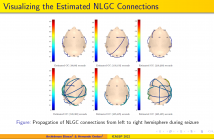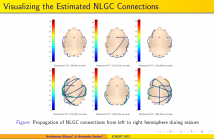
ICASSP 2022 - IEEE International Conference on Acoustics, Speech and Signal Processing is the world’s largest and most comprehensive technical conference focused on signal processing and its applications. The ICASSP 2022 conference will feature world-class presentations by internationally renowned speakers, cutting-edge session topics and provide a fantastic opportunity to network with like-minded professionals from around the world. Visit the website.

We propose a new meta learning based framework for low resource speech recognition that improves the previous model agnostic meta learning (MAML) approach. The MAML is a simple yet powerful meta learning approach. However, the MAML presents some core deficiencies such as training instabilities and slower convergence speed. To address these issues, we adopt multi-step loss (MSL). The MSL aims to calculate losses at every step of the inner loop of MAML and then combines them with a weighted importance vector.
- Categories:
 19 Views
19 Views
- Read more about CNN-AIDED FACTOR GRAPHS WITH ESTIMATED MUTUAL INFORMATION FEATURES FOR SEIZURE DETECTION
- Log in to post comments
We propose a convolutional neural network (CNN) aided factor graphs assisted by mutual information features estimated by a neural network for seizure detection. Specifically, we use neural mutual information estimation to evaluate the correlation between different electroencephalogram (EEG) channels as features. We then use a 1D-CNN to extract extra features from the EEG signals and use both features to estimate the probability of a seizure event. Finally, learned factor graphs are employed to capture the temporal correlation in the signal.
- Categories:
 16 Views
16 Views
- Read more about Mixture Model Auto-Encoders: Deep Clustering through Dictionary Learning
- Log in to post comments
mixmate.pdf
- Categories:
 18 Views
18 Views
- Read more about High-Dimensional Sparse Bayesian Learning without Covariance Matrices
- Log in to post comments
- Categories:
 23 Views
23 Views

- Read more about Automatic Depression Detection: An Emotional Audio-Textual Corpus and a GRU/BiLSTM-based Model
- Log in to post comments
- Categories:
 26 Views
26 Views
- Read more about Variable span trade-off filter for sound zone control with kernel interpolation weighting
- Log in to post comments
A sound zone control method is proposed, based on the frequency domain variable span trade-off filter (VAST). Existing VAST methods optimizes the sound field at a set of discrete points, while the proposed method uses kernel interpolation to instead optimize the sound field over a continuous region. When the loudspeaker positions are known, the performance can be improved further by applying a directional weighting to the interpolation procedure.
- Categories:
 11 Views
11 Views
- Read more about Variable span trade-off filter for sound zone control with kernel interpolation weighting
- Log in to post comments
A sound zone control method is proposed, based on the frequency domain variable span trade-off filter (VAST). Existing VAST methods optimizes the sound field at a set of discrete points, while the proposed method uses kernel interpolation to instead optimize the sound field over a continuous region. When the loudspeaker positions are known, the performance can be improved further by applying a directional weighting to the interpolation procedure.
- Categories:
 23 Views
23 Views
